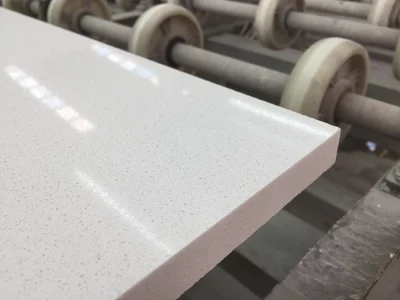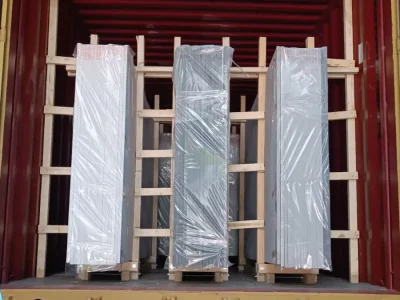Do you know how to choose the right quartz thickness for countertops? This article will professionally and comprehensively tell you everything about quartz thickness.
Table of Contents
What Is the Thickness of Quartz?
The thickness of a quartz slab is the consistent distance from the top to the bottom surface. It also indicates the slab’s flatness, which is one of the standards for evaluating its quality. The measurement units are in inches, millimeters, or centimeters, and you can use a high-precision digital caliper to measure it.

Typical Quartz Countertops Thickness
Quartz countertops have multiple thickness options. You need to choose the right thickness based on load-bearing requirements and cost. Below are some common regular quartz thicknesses:
- 1cm or 12mm quartz: We only advise using it as cut-to-size for floor tiles. If used for worktops, it is too thin, and transportation and processing are prone to issues.
- 15mm quartz: This is the minimum recommended thickness for quartz worktops. It is also the slab that can load the squarest meters.
- 18mm quartz: Very popular in South American countries. A 3200x1600x18mm slab can generally load 119 pieces.
- 20mm quartz: The most used thickness worldwide. It has a high cost-performance ratio.
- 30mm quartz: The thickest quartz slab currently producible. The base cabinets below must have sufficient load-bearing capacity.
- 40mm quartz countertops: Also known as double-thick quartz countertops. This thickness is achieved by thickening the outer edges, making the countertop look thicker.

Why You Need to Know Different Thicknesses?
Quartz slabs and countertops are not simply better when thicker. Factors such as price, loading capacity, usage scenarios, and weight-bearing need to be considered to choose the appropriate thickness.
- Thickness affects price: Generally, the thicker the quartz, the higher the price per square meter. You need to first understand the popular thickness in your local market.
- Thickness determines loading capacity: If you are a wholesaler importing quartz slabs in bulk, you need to know how thickness affects container loading capacity. With standard wooden crate packaging, the 20ft container loading quantity for different thicknesses is as follows:
- 15mm: 140 slabs
- 18mm: 119 slabs
- 20mm: 105-108 slabs
- 30mm: 70 slabs
The thicker the slab, the fewer pieces fit in a container. The actual loading quantity must also consider local road weight restrictions.
- Thickness determines application scenarios:
- 15mm and below: Generally used for floor tiles, shower walls, or background walls.
- 18mm-30mm: Commonly used for various countertops, such as kitchen worktops, islands, waterfalls, bathroom vanity tops, laundry room tops, and many commercial countertops projects.

2cm VS 3cm Quartz
Usage scenario and performance of 2cm and 3cm quartz thickness have big differences.
- It has a greater load-bearing capacity and is more durable than 2cm: 3cm provides more stability and can bear heavier loads. 3cm quartz countertops are safer and more reliable in kitchens where heavy equipment is used frequently, cutting and pounding, etc.
- Weight and installation difficulty: 3cm quartz countertops are heavier than 2cm and require a more stable support structure during installation. Maintenance and replacement are also relatively complicated.
- If the budget is less or weight is a factor, 2cm quartz would be best. 2cm quartz kitchen countertops already have enough resistance for daily use, satisfying the requirements of most families at a more reasonable price.
Conclusion
Grasping quartz thickness specifications equips you with deeper insights into slab dimensions and countertop applications, creating a solid foundation for initiating import operations and wholesale distribution.
FAQs
What is the standard thickness of quartz countertops?
1.8cm, 2cm, and 3cm.
How thick is 2cm quartz and 3cm quartz?
You can use a US dollar coin as a reference: 2cm is between the diameter of a penny and a nickel. 3cm is approximately equal to the diameter of a half dollar if you have it.
What is the average quartz countertop thickness?
The average quartz countertop thickness is around 2cm.
How thick should quartz countertops be?
Although 1.5cm is the thinnest current thickness, we recommend at least 1.8cm.
What is the most recommended countertop thickness in 2025?
1.8cm. Because it is the most cost-effective countertop thickness.
Is there any special thickness customizable? Such as 1.7cm?
Yes, some projects require special thicknesses such as 1.7cm, 1.9cm, or 2.5cm, to meet the requirements.
Is 2cm quartz thick enough?
Yes. 2cm quartz is the standard thickness for most countertops.
